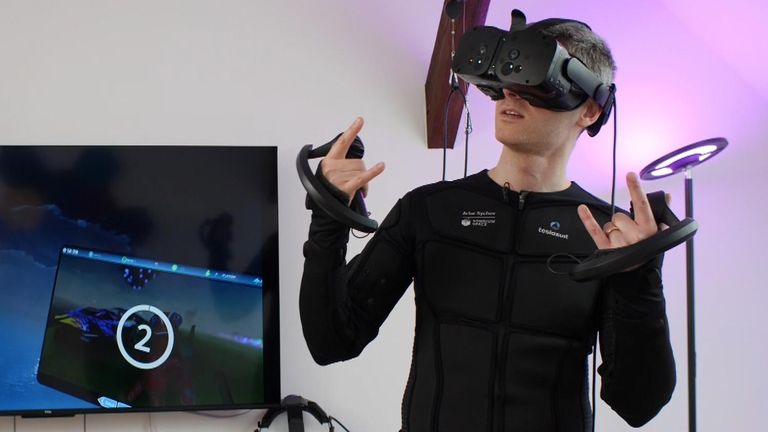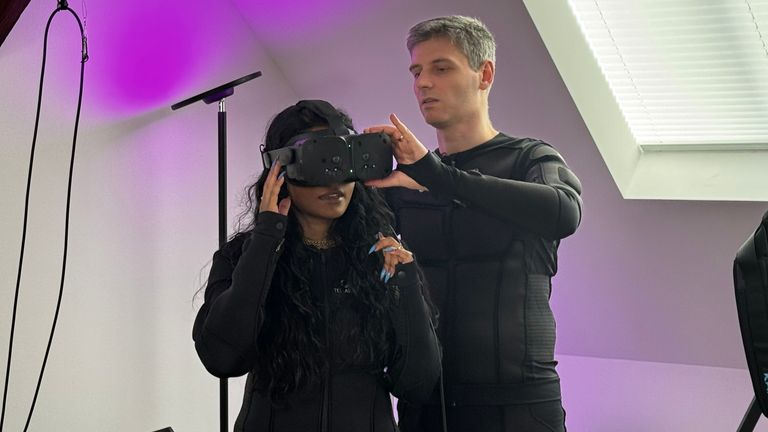The new tech bringing loved ones back to life through AI
When Artur Sychov's father received a cancer diagnosis, he faced the stark reality that there might come a time when he couldn't communicate with him anymore. At 38 years old, Sychov acknowledged that he would do anything to have one more conversation with his father after his passing. Using artificial intelligence, Artur Sychov embarked on a mission to address this longing by creating a virtual reality tool called "live forever mode." This innovative tool generates digital avatars capable of mimicking a person's voice, gestures, and behaviors after just 30 minutes of observation by the user. The ultimate aim is to preserve the essence of a person online so that future generations of their family can interact with this digital representation.
Using artificial intelligence, Artur Sychov embarked on a mission to address this longing by creating a virtual reality tool called "live forever mode." This innovative tool generates digital avatars capable of mimicking a person's voice, gestures, and behaviors after just 30 minutes of observation by the user. The ultimate aim is to preserve the essence of a person online so that future generations of their family can interact with this digital representation.
Sychov sees numerous benefits to this technology, emphasizing the opportunity it provides to truly get to know the person, hear their voice, engage in conversations on various topics, and even inject aspects of their personality. He believes that with time, the accuracy of these avatars will improve, becoming increasingly indistinguishable from the original person.
Companies worldwide are exploring various methods to reshape our connection with deceased loved ones, yet there are apprehensions surrounding these endeavors. Elaine Kasket, a cyber psychologist and author, highlights the ethical considerations involved.
She observes that such initiatives often exploit individuals' deep-seated anxieties about mortality, which can be unsettling for many. Kasket expresses reservations about leveraging these existential fears as a marketing strategy for selling products and services.
Artur's company, Somnium Space, is currently conducting trials of his "live forever mode" at its headquarters in Prague, Czech Republic, prior to its official launch. Somnium Space is a 3D metaverse platform accessible via virtual reality headsets, where users inhabit avatars capable of engaging in various activities such as gaming, creating art, attending events, and trading virtual goods with others. Since its establishment in 2017, the platform has amassed 300,000 downloads, with a daily user base ranging from 50 to 250 individuals. Artur himself utilizes the tool, presenting his avatar as a blue robot. During interactions within the virtual space, Artur dons a digital headset and engages with his avatar, which responds with familiarity, stating, "You sound familiar," to which Artur's avatar replies, "I'm actually Artur."
Artur himself utilizes the tool, presenting his avatar as a blue robot. During interactions within the virtual space, Artur dons a digital headset and engages with his avatar, which responds with familiarity, stating, "You sound familiar," to which Artur's avatar replies, "I'm actually Artur."
Artur presents a challenge, questioning the identity of the avatar: "You're aware that I'm Artur. You're not Artur. So, who are you?"
The avatar responds in a playful manner: "I see you're attempting to crack a joke there. It appears you may have been interrupted. Would you like to finish the joke?"
When I test the technology myself, a user named UltraLord "shakes" my avatar's hand and offers a virtual hug. Although I don't experience any physical sensation, I still feel embraced.
Woman 'chats' to dead mother using AI - with 'spooky' results I lost my job after AI tool assessed my body language
UltraLord acknowledges that by creating something beyond his control, he's accepted the prospect that he won't be able to manage it after his death. He expresses a sense of resignation, stating, "If it ever goes rogue, then I really don't know what to do... Well, I wouldn't be able to do anything..."
The "live forever mode" tool is anticipated to have an official launch later this year, yet several uncertainties persist. While it will be financed through a subscription fee, the specifics of this fee remain undetermined. Additionally, there's ambiguity regarding who will assume responsibility for payment after the creator passes away.
Users can buy and sell virtual goods in the metaverse, and their avatars can continue to do this after they die if they have signed up for the live forever mode. But it is up to users to make sure their family can access their accounts and benefit from their posthumous earnings.
Somnium Space says it does not keep any of the data used to train the avatar on its servers. It is all stored locally on the computers of its users across the world, and they can control how much or how little to store.
But what happens to personal data after you die is a point of contention.
How it really works
Ms. Kasket cautions that in practical terms, if someone with malicious intentions were to access your information shortly after your passing, before your family has the chance to decide how to manage your online data, there's a risk of impersonation and manipulation of your data. She highlights the alarming possibility of you being impersonated even in your former employment, such as continuing to lecture at a university.
Moreover, Ms. Kasket emphasizes the lack of regulation in this area, raising doubts about whether your family would receive any financial benefit from such activities.
As technology progresses, we're entering a future where we can extend our legacies online and connect with deceased loved ones in unprecedented ways. However, this advancement comes with a cautionary note: we must also prepare for the potential far-reaching consequences on our legacies and the real lives of our loved ones.



































